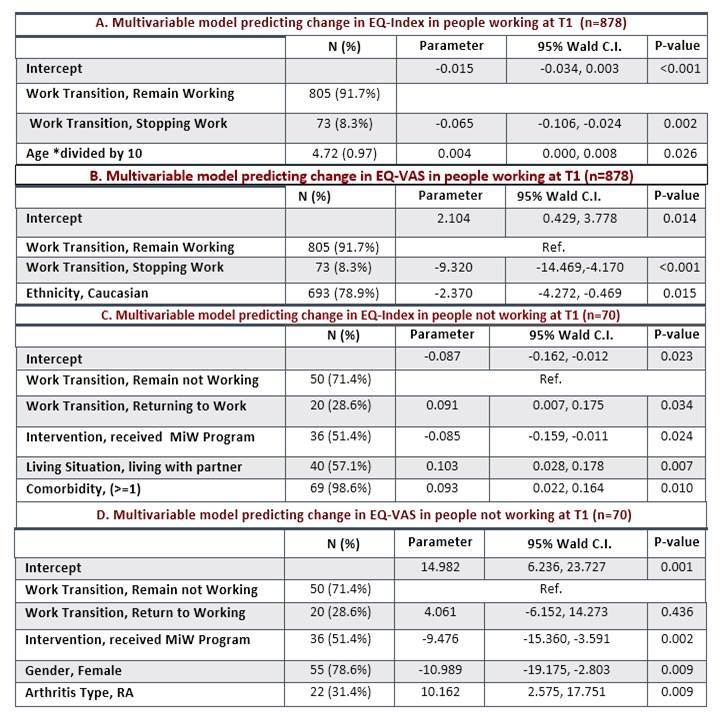Session Information
Session Type: ACR Poster Session B
Session Time: 9:00AM-11:00AM
Background/Purpose: People with inflammatory arthritis (IA) frequently have to stop working due to their arthritis. It is assumed that economic and psychosocial consequences of premature work cessation lead to reduced well-being. Yet, patients who were struggling at work could experience an improvement in quality of life. Our objective was to evaluate the association between transition in work status and changes in quality of life (QoL) in patients with inflammatory arthritis (IA).
Methods: We conducted a prospective study using data from the RCT of an employment intervention, the Making it Work program, aimed at helping people with IA stay employed. Participants were recruited from rheumatologist practices, consumer organization (Arthritis Consumer Experts), and advertisements. Eligibility criteria included: IA diagnosis, employed, age 19-59, and concerns about arthritis affecting ability to work. Surveys were administered online at baseline and every 6 mos for up to 3.5 years. Working status was defined as “Currently working” vs. “currently not working” if not working for any reason (incl. sick leave). Working status over two consecutive surveys was categorized as: 1) Remaining working; 2) Stopping work; 3) Remaining not working; or 4) Returning to work. QoL was measured using EQ5D-Index (0-1) and EQ5D-VAS (0-100). Linear GEE models were used to predict changes in EQ5D-Index and EQ5D-VAS scores between 2 consecutive surveys, acc. to work transitions, after controlling for potential confounders.
Results: The sample includes all RCT subjects with at least two consecutive surveys by 12/2016 (N= 367 people; 948 pairs of surveys; 77% females, mean age: 46yrs, 54% with RA, AS: 20%; PsA: 14%; SLE: 12%). Amongst people working at the first survey, stopping work (vs. remaining at work) was associated with worsening in QoL (EQ-index and EQ-VAS). Amongst those not working at the first survey, returning to work (vs. remaining off work) was associated with improvement in QoL (EQ-Index; not signif. for EQ-VAS) (Table 1). We observed little to no change in QoL when people remained in the same work status (data not shown).
Conclusion: Our results suggest that remaining employed or returning to work is beneficial for QoL in workers with IA. This provides useful information to guide people with arthritis in their decisions about continuing, stopping, or returning to work; and provides evidence in support of initiatives aimed at helping individuals with IA remain employed.
To cite this abstract in AMA style:
Bartels W, Sayre EC, Rogers P, Lacaille D. Transition in Work Status and Quality of Life in People with Inflammatory Arthritis [abstract]. Arthritis Rheumatol. 2017; 69 (suppl 10). https://acrabstracts.org/abstract/transition-in-work-status-and-quality-of-life-in-people-with-inflammatory-arthritis/. Accessed .« Back to 2017 ACR/ARHP Annual Meeting
ACR Meeting Abstracts - https://acrabstracts.org/abstract/transition-in-work-status-and-quality-of-life-in-people-with-inflammatory-arthritis/

